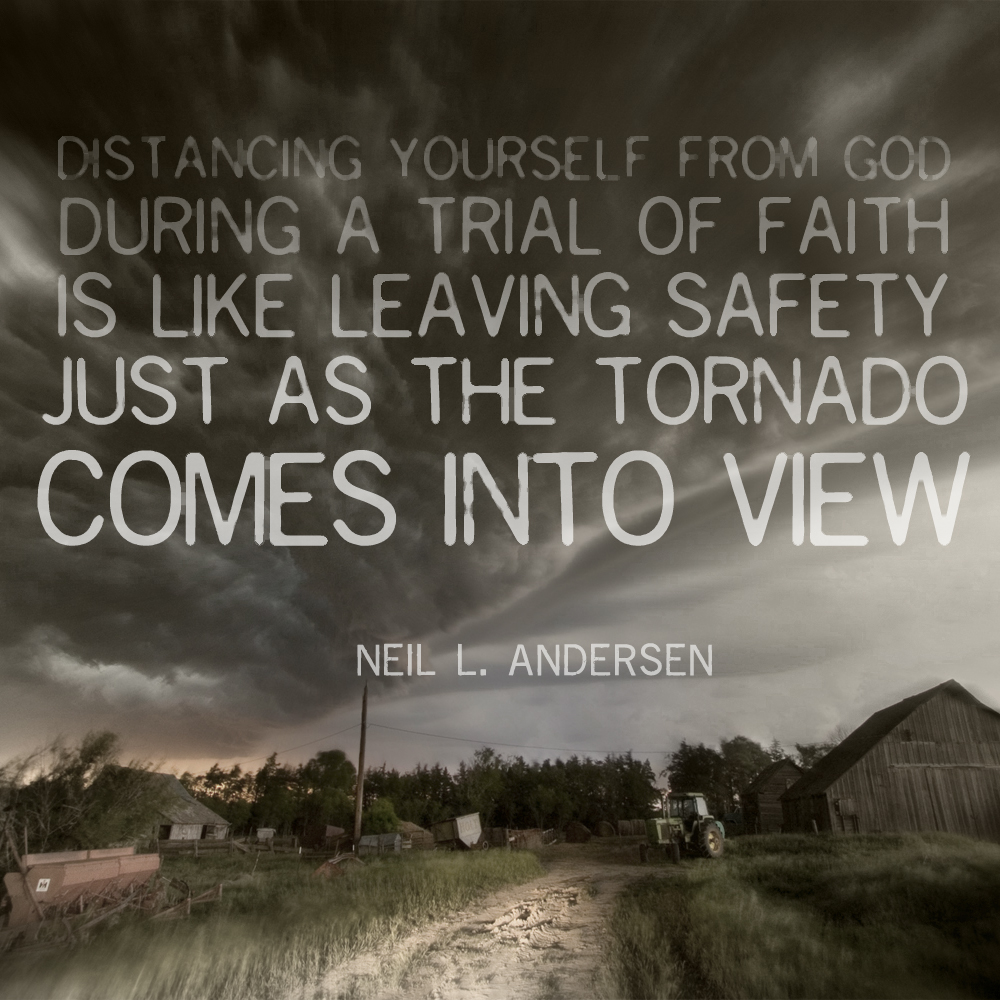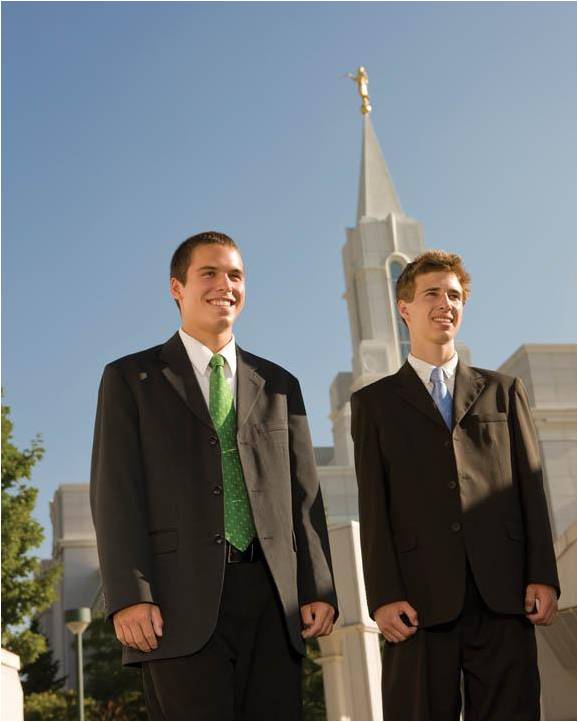The digital age gives new meaning to the phrase “power to the people.” No longer do people have to wait for the nightly newscast or the newspaper to find information. All of this is available any time, day or night, through the Internet—on smart phones, handheld devices and computers. And no longer are the news media the only source of information. Anyone who has access to the Internet has a voice to broadcast his or her beliefs and opinions in picture, video and the written word. Knowledge is power, and so is the ability to disseminate it. And the power is in the hands of the people.
 For members of The Church of Jesus Christ of Latter-day Saints—sometimes inadvertently called the Mormon Church—this is presenting both opportunities and challenges. The opportunities to share the gospel online are vast. The challenges arise in how to handle misinformation and outright lies—and sometimes in trying to figure out which information is true, which is misleading and which is just plain false. This has led to what some people are calling “shaken faith syndrome,” where faithful members of The Church of Jesus Christ are voicing doubts after reading something online. The problem and the answer are the same: more knowledge. The difference lies in where you seek it.
For members of The Church of Jesus Christ of Latter-day Saints—sometimes inadvertently called the Mormon Church—this is presenting both opportunities and challenges. The opportunities to share the gospel online are vast. The challenges arise in how to handle misinformation and outright lies—and sometimes in trying to figure out which information is true, which is misleading and which is just plain false. This has led to what some people are calling “shaken faith syndrome,” where faithful members of The Church of Jesus Christ are voicing doubts after reading something online. The problem and the answer are the same: more knowledge. The difference lies in where you seek it.
‘Shaken Faith Syndrome’: Otherwise Known as a Trial of Your Faith
Although much is being made of the “shaken faith syndrome,” this is not a new phenomenon. Since the beginning of The Church of Jesus Christ in modern times, people have become disenchanted with the Church, its doctrines or teachings, or its leaders. Their faith has been shaken. Far from condemning those struggling with a trial of faith, leaders of The Church of Jesus Christ have responded with compassion. Elder Neil L. Andersen, an apostle of the Lord Jesus Christ— said:
Offense comes in many costumes and continually finds its way onstage. People we believe in disappoint us. We have unanticipated difficulties. … We wonder about a doctrinal issue. We learn of something spoken from a Church pulpit 150 years ago that bothers us. … It could be a hundred things, each very real to us at the time. [1]
These events can plant seeds of doubt into faithful members of The Church of Jesus Christ. We are sent to earth to be tried and tested, to see if we will follow Jesus Christ in all things, no matter what. Trials of our faith are an integral aspect of this plan. The Apostle Peter wrote, “Think it not strange concerning the fiery trial which is to try you, as though some strange thing had happened unto you” (1 Peter 4:12). We must all expect these fiery trials, but we must also understand how to react to them. Elder Andersen said:
These fiery trials are designed to make you stronger, but they have the potential to diminish or even destroy your trust in the Son of God and to weaken your resolve to keep your promises to Him. These trials are often camouflaged, making them difficult to identify. They take root in our weaknesses, our vulnerabilities, our sensitivities, or in those things that matter most to us. A real but manageable test for one can be a fiery trial for another.
How do you remain “steadfast and immovable” during a trial of faith? You immerse yourself in the very things that helped build your core of faith: you exercise faith in Christ, you pray, you ponder the scriptures, you repent, you keep the commandments, and you serve others.
When faced with a trial of faith—whatever you do, you don’t step away from the Church! Distancing yourself from the kingdom of God during a trial of faith is like leaving the safety of a secure storm cellar just as the tornado comes into view. [2]
And we would be wise to follow the counsel of Elder Jeffrey R. Holland, an Apostle of Jesus Christ, who said:
This is a divine work in process… so please don’t hyperventilate if from time to time issues arise that need to be examined, understood, and resolved. They do and they will. In this Church, what we know will always trump what we do not know. And remember, in this world, everyone is to walk by faith. [3]
Consider the Source & Hold Fast to What You Already Know
A person’s trial of faith may begin with reading information critical of The Church of Jesus Christ or its doctrines, but it can end by seeking the source of true doctrine and divine instruction: the Savior and His teachings. The scriptures teach, “Whatsoever is good cometh from God, and whatsoever is evil cometh from the devil” (Alma 5:40 in the Book of Mormon—another testament of Jesus Christ and a companion scripture to the Bible). The scriptures also teach us to “seek ye out of the best books wisdom and learning, even by study and also by faith” (Doctrine & Covenants 88:118—the Doctrine & Covenants is a book of modern revelations). There is a reason we are counseled to study “out of the best books”—because it will allow us to have the Spirit of God as we study and learn. The same information presented in different ways can have vastly different effects. One can bolster our faith in God and His prophets, and the other can destroy it if we allow it. Elder Holland advised,
In moments of fear or doubt or troubling times, hold the ground you have already won, even if that ground is limited. … When those moments come and issues surface, the resolution of which is not immediately forthcoming, hold fast to what you already know and stand strong until additional knowledge comes. [3]
In holding to what we know, we must look to the sources we can trust. Although critics have accused leaders of The Church of Jesus Christ of being secretive, this is not the case. In fact, John W. Welch, a law professor and editor-in-chief of the scholarly journal BYU Studies at Brigham Young University, wrote:
… Many people feel that they have been left in the dark on certain subjects. BYU Studies may shed some important light on those subjects. While no one has all the answers to every question, the BYU Studies website, together with many other resources and publications, are now easily available to provide many well-researched and well-written treatments of topics of current interest. We invite people to familiarize themselves with this website. It may come in very handy.
The BYU Studies Quarterly journal has been published for over 54 years. Each issue has covered ground-breaking, rigorous articles about Mormon history, scripture, documents, and subjects from a wide variety of academic disciplines. [4]
Rather than trying to cover up the history of The Church of Jesus Christ in the modern times, the BYU scholars are putting the events into the context in which they occurred. History does not unfold in a vacuum. You have to understand what is happening around the people to fully comprehend the what, why and how something happened.
‘Lord, I Believe; Help Thou Mine Unbelief’
In trials of our faith, we must start with the basics—what we know and what we believe. If we don’t hold true to the basics, the Savior cannot add unto them. Elder Holland continued:
When problems come and questions arise, do not start your quest for faith by saying how much you do not have, leading as it were with your “unbelief.” That is like trying to stuff a turkey through the beak! Let me be clear on this point: I am not asking you to pretend to faith you do not have. I am asking you to be true to the faith you do have. Sometimes we act as if an honest declaration of doubt is a higher manifestation of moral courage than is an honest declaration of faith. It is not! So let us all remember: … Be as candid about your questions as you need to be; life is full of them on one subject or another. But if you and your family want to be healed, don’t let those questions stand in the way of faith working its miracle. [3]
Knowledge is power, but so is faith. And both are required for us to progress. Sometimes we have to walk by faith, holding onto the things we do know until we receive greater understanding of the things we don’t. In speaking of faith and doubt, Elder Holland referenced the story of a man who sought the Savior’s help in blessing his son, who was sick. Jesus said to the father, “If thou canst believe, all things are possible. To which the father replied, “Lord, I believe; help thou mine unbelief” (Mark 9:20-24). Elder Holland taught concerning this father and son:
It was of this very incident, this specific miracle, that Jesus said, “If ye have faith as a grain of mustard seed, ye shall say unto this mountain, Remove hence to yonder place; and it shall remove; and nothing shall be impossible unto you” (Matthew 17:20). The size of your faith or the degree of your knowledge is not the issue—it is the integrity you demonstrate toward the faith you do have and the truth you already know. [3]
So when fiery trials of faith come—and they will—we must be ready to hold onto what we do know, and not allow the doubts to overwhelm us. Trials of faith come in all sizes and packages. What is a manageable trial for one person might be a severe test of everything another person believes. I had one such trial. Whereas others seemed to quickly get past a certain event, I was brought to my knees by the incident. It was a sore trial of my faith and everything I thought I believed—even whether Heavenly Father really did love me. It was only in holding fast to what I knew to be true that I was able to work through my pain and anguish of soul. And to be honest, it’s not over. It just gets easier to handle. Trials of our faith are like that. They are earth-shattering, painful experiences that literally bring us to our knees. If we take the opportunity, while on our knees, to seek the Lord, our answers will come—through study, by faith and by holding onto to what we know, so the Lord can add unto it.
I am a wife and mother of 4 beautiful children in a small town in the mountains of Idaho. We ski as a family in the winter and camp, fish, and go to the beach in the summer. I’m a lifelong member of The Church of Jesus Christ of Latter-day Saints, and I am grateful for the Savior and the blessings of the gospel in my life.


